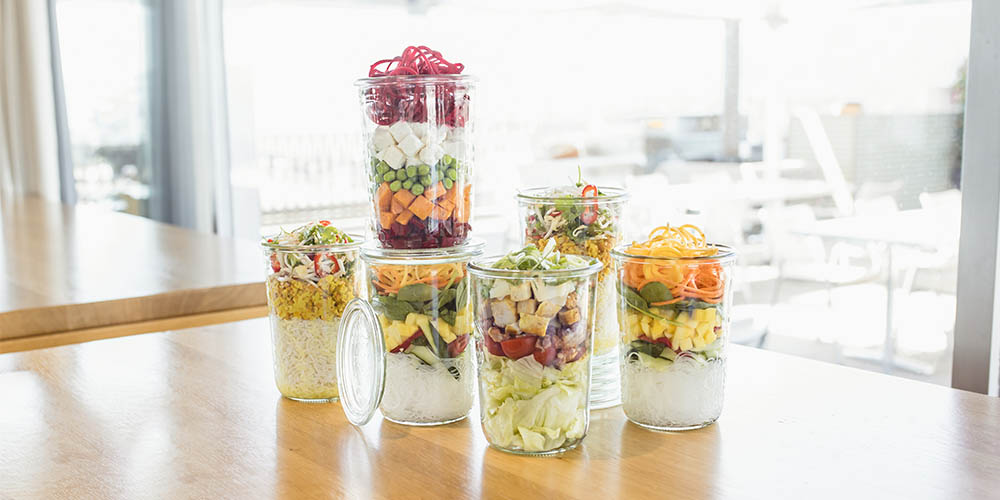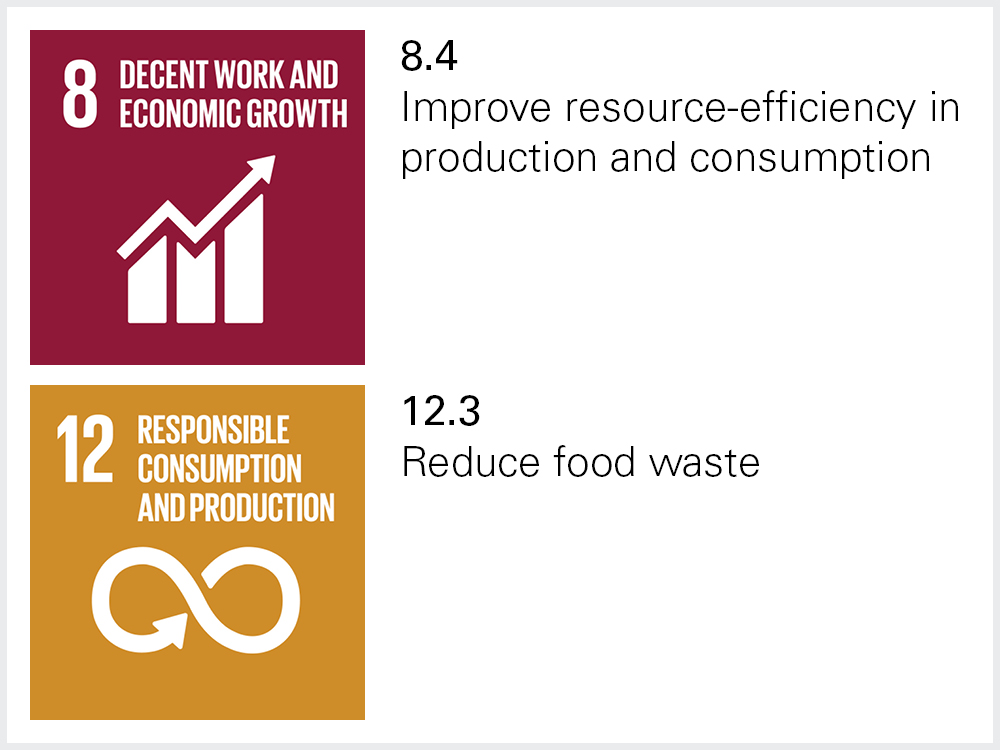Catering

The past two years have been markedly different for the University of Basel's cafeterias. Many important goals relating to sustainable food and drink were achieved in 2019: reduced greenhouse gas emissions and less food waste, and a higher proportion of certified fish and meat from ethical farming. In 2020, the catering operations were open only intermittently due to the stringent restrictions.
Spotlight on environmentally friendly nutrition
The production and consumption of food have a huge impact on the environment. At the University of Basel, an average of 220,000 meals are sold every year, emitting 472.5 t CO2-eq.1 The University of Basel and cafeteria visitors can thus make an important contribution to sustainable development in this area. The university takes its responsibility seriously: the Catering Committee and the SV Group jointly define targets and actions that are reviewed annually.

As a result of the university's commitment to sustainable catering, numerous projects are being launched to meet the objectives of the SV Group's sustainability program One Two We. This high level of commitment is also reflected in students’ interest and willingness to change. As President of the Catering Committee, I look forward to tackling the challenges of the future.
Jennifer Kimmel, President of the Catering Committee
Slight decline in greenhouse gas emissions
In 2019, the average greenhouse gas emission per meal was about 2.07 kg CO2-eq. In absolute terms, this corresponds to approx. 484 metric tonnes of CO2-eq emitted by all catering services at the University of Basel in 2019, a reduction by 88 metric tonnes of CO2-eq compared with 2018. The number of meals sold dropped by 80 % in 2020, with emissions per meal at an average of 1.67 kg CO2-eq. The reason for the sharp decline in emissions in comparison with 2019 was the lower number of catered events (which often involve meat) and the higher number of vegetarian meals sold. In total, emissions of 75 metric tonnes of CO2-eq resulted from catering in 2020.
A number of measures have been implemented to make catering more sustainable: 50 % of meals are vegetarian or vegan and various fair trade standards and IP-Suisse label foods are now used. One Climate Day is held twice a year: on these days, only environmentally friendly meals are sold. The percentage of food transported by air is also very low. In 2019, the share of goods requiring air transport made up 0.15 % of the total shopping cart; in 2020, it had dropped to 0.06 %.

The University of Basel's Catering Committee is the body that makes major decisions. A lot has already been done to achieve a sustainable food supply. In future, we must increase our efforts to meet the minimum requirements of the Paris Agreement.
Julian Muff, medical student and member of the Catering Committee
Consistently low food and packaging waste
The percentage of food waste per meal has been kept at a very low level for years; in 2019, it was 36 g/meal.2 To further reduce food waste and packaging waste, since 2020 meals from the previous day have been discounted and offered under the Swiss-wide campaign label «Save food, fight waste». Since 2020, ANDIAMO products and iced tea are also available in a reusable glass. Straws are no longer available. The SV Group also participates in reCIRCLE, a reusable food packaging system with a deposit scheme. Discounts are offered on hot drinks to those who bring their own cup.
Animal welfare
The percentage of certified fish3 and meat from animal-friendly husbandry4 has continued to rise in the past two years in comparison with 2018. All the beef, veal and pork used in catering at the University of Basel was sourced 100 % from Switzerland. All fish and seafood served in cafeterias at the University of Basel are classified as recommended or acceptable for consumption by WWF Schweiz.
Goals & actions
Continue to expand the range of sustainable products
Expand the range of sustainable products by increasing the number of certified label products (at least 70% ASC/MSC for fish and seafood, 50% BTS/RAUS for beef/pork, 100% BTS RAUS for veal)
Increase sales of vegan and vegetarian menus by making the product range more attractive, including use of plant-based meat alternatives and targeted monitoring of sales for eight weeks over the year
Office of the Executive Director
SV Group
Sustainability Office
Office of the Executive Director
SV Group
Sustainability Office
Reduce greenhouse gas emissions
Develop a new monitoring system for evaluating the percentage of vegan/vegetarian menus and greenhouse gas emissions caused by catering
Office of the Executive Director
SV Group
Sustainability Office
Further reduce packaging waste
Reduce packaging waste through greater communication of «reCIRCLE» recycling system and sale of take-out products in glass containers (Andiamo), and discounts on hot drinks if customer brings own cup
Office of the Executive Director
SV Group
Sustainability Office
Further reduce food waste
Reduce food waste by selling previous day's meals, supported by a marketing campaign
Office of the Executive Director
SV Group
Sustainability Office
Continue to expand the range of sustainable products
Annual evaluation of sustainable shopping cart and ongoing review of expansion
Office of the Executive Director
SV Group
Sustainability Office
[1] The number of meals sold and the resulting greenhouse gas emissions is the average of the years 2016 - 2019.
[2] In 2020, no data was collected because catering services were closed due to the coronavirus pandemic.
[3] MSC (Marine Stewardship Council) or ASC (Aquaculture Stewardship Council) certified
[4] BTS (Besonders tierfreundliche Stallhaltung - particularly animal-friendly farming) and RAUS (Regelmässiger Auslauf im Freien - regular freedom to move around outdoors) are Swiss animal welfare programs that go far beyond the requirements of the Swiss Animal Welfare Act.



